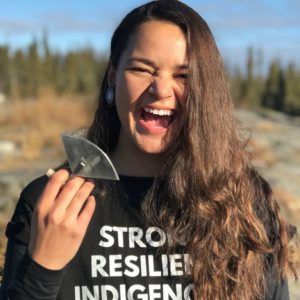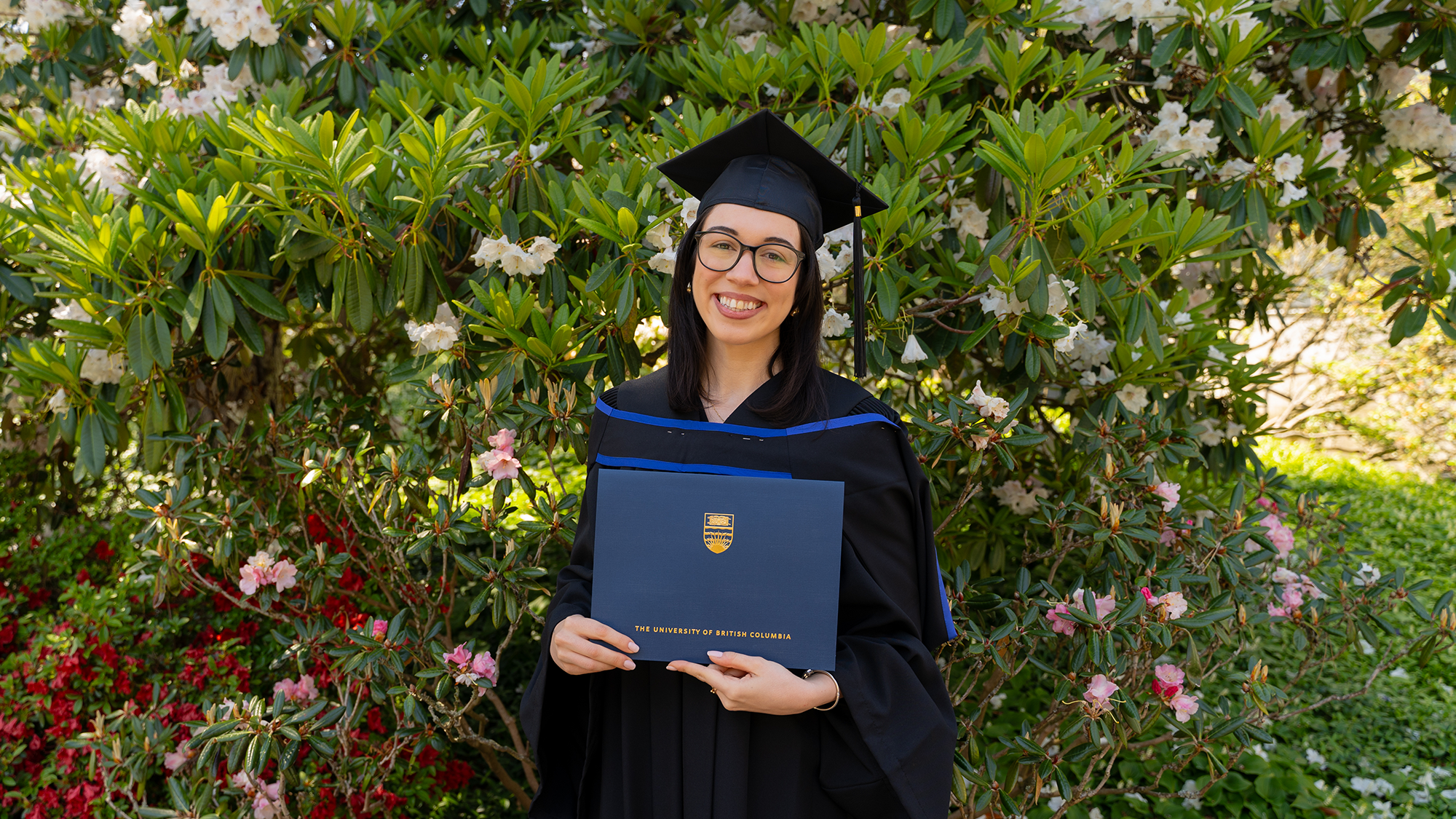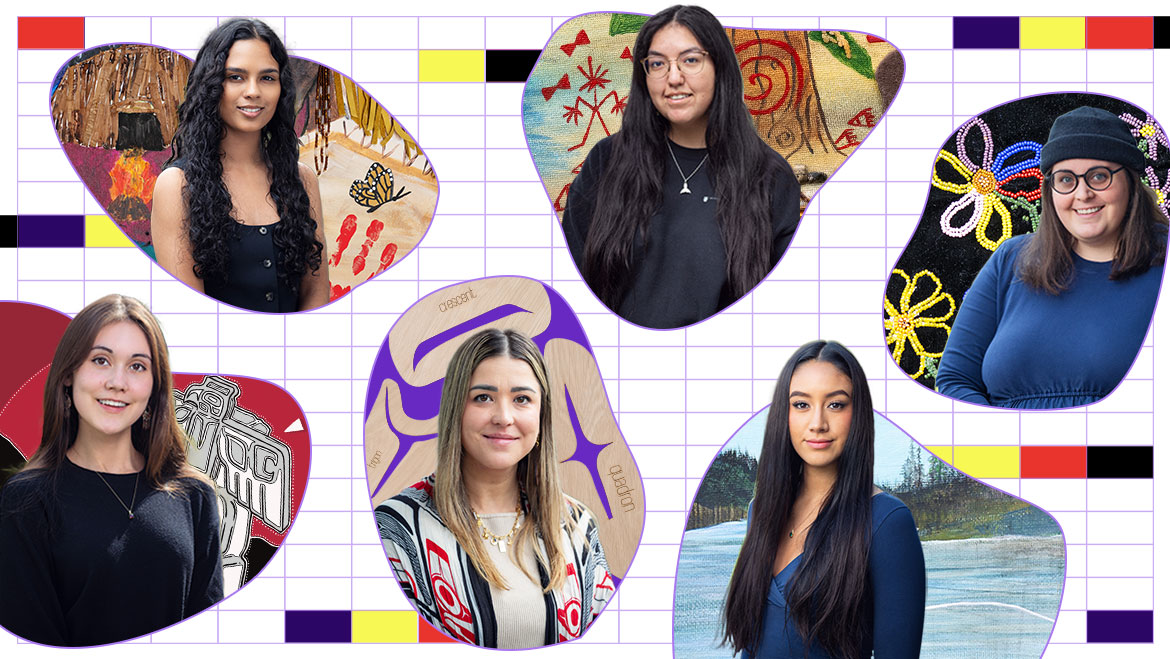Kyla LeSage is from the Vuntut Gwitchin in Old Crow, Yukon on her maternal side and Anishinaabeg from Garden River, Ontario on her paternal side. She grew up outside of her traditional territories where she is grateful to call Sombe K’a Yellowknife, NWT her home on the traditional land of the Yellowknives Dene First Nations in Denendeh. Kyla is currently in her final year of her undergrad and she will be graduating this spring with a major in Political Science and a minor in First Nations and Indigenous Studies.

You participated to campus from the Dechinta program. Where did you hear about the program and what made you decided to embark on this educational journey?
I first heard of the Dechinta program when Glen Coulthard, the cofounder presented on the program in one of my FNIS courses, as well as posters around the Longhouse. I decided to embark on this journey in order to decolonize my education and return to traditional and cultural practices on the land. I am now a part time employee of Dechinta so if anyone has any questions feel free to contact me!
Describe one of your favourite moments during your time at Dechinta.
I have many favorite moments from my time at Dechinta, however, one that I continue to share is my experience harvesting my very first moose. While on the land, we were gifted with a moose that one of our bush hands hunted. I was able to learn and experience the different traditional harvesting practices from giving thanks to the creator and the animal, to making dry meat and preparing the moose hide. This learning experience showed us the ways in which our ancestors and elders continue to survive on the land, as well as showing us the sacredness of harvesting an animal to feed our bush community. We spent hours with elders preparing the meat and hide, while also eating the moose meat for all meals for the following week. I have also been able to attend the Dechinta Solidarity Gathering this April where I was able to meet and learn from well-known Indigenous and Black Lives Matter scholars and activists including Robyn Maynard, Melanie Yazzie, Natalie Knight, Tasha Spillet, Harsha Walia and organizers of the Freedom School in Toronto. This gathering has inspired me to do more to protect people of color throughout Turtle Island and the world while also allowing me to create connections with other activists who share the same vision as myself.
You had the opportunity to work with and learn from Leanne Betasamosake Simpson. Many UBC students have read her work, can you tell us about your experience with her?
Learning from Leanne Betasamosake Simpson was incredible and life changing. Throughout my undergrad I had read all of her work however, it was by meeting her and learning directly from her that I was able to incorporate her writing into learning my own Anishinaabe culture. She taught me how to introduce myself in Anishinaabemowin and gave me my new nickname; Gwitchinaabeg (Gwitchin and Anishinaabeg). In the months following Dechinta, Leanne has also been a mentor and role model to me where she has shared ways for me to bring my knowledge and experience to my own Anishinaabe community in Garden River Ontario. Leanne’s writing is an important way to show not only myself by other Indigenous peoples ways to decolonize our writing and to share our Indigenous knowledge without the barriers of academia. Miigwech to Leanne for all that she has done for me.
Since you became a UBC student, what ways have you been able to practice your culture on campus? Do you have advice for how Indigenous students can stay involved with their culture while being busy students?
I have been able to practice my culture by joining groups such as the Indigenous Leadership Collective where I have been able to meet and learn from other Indigenous students. Through this group I have attended numerous Indigenous rallies, marches and participated in a traditional sweat lodge at the First Nations Longhouse. I have also taken a course in FNEL where I have been able to research and learn my traditional Gwich’in language and create projects in my language. Returning from Dechinta I have been able to share the traditional practices of the Dene peoples that I learned on the land with other Indigenous and non-Indigenous students to show the importance of protecting and reclaiming not only Indigenous culture but also identity. My advice to other Indigenous students is to reach out and join Indigenous groups and committees on campus where you can learn and share experiences with other like-minded Indigenous students from all over Turtle Island. I would also say to reach out to the Aboriginal Student Affairs and Advising to help plan out your education journey and become aware of the amazing support that they offer.
You are very active with your Indigenous advocacy involvement. What inspires or motivates you to attend rallies and protests? What are some self-care tips that you have for other Indigenous students who are also passionate about Indigenous focused issues?
My main inspiration comes from my Gwitchin Jijuu (grandmother). She has been an advocate for Indigenous communities for over 60 years where she volunteers with organizations and takes part in rallies such as the Oka Crisis to support Indigenous peoples across Canada. I am grateful to come from a strong line of matriarchs and ancestors that have given me the strength and resilience to advocate for Indigenous communities and the land. My main goal in life is to help make a difference within communities which is why I think it is so important to stand in solidarity with other Indigenous peoples in order to protect our sacred land, waters and culture. My self-care tips for other passionate Indigenous advocates is to make sure to reach out for help if things become too much to handle on your own. It is difficult to see and experience the violence against our people and land, but we must remember that strength comes in numbers and that you are not alone in the struggle. Finding other Indigenous support systems such as other students or ASA was crucial for my advocacy to ensure that I was able to continue my studies without allowing my passions to overwhelm me.
ASA Tip: Interested in exchange opportunities? Check out Go Global and connect with ASA to plan your travels.


